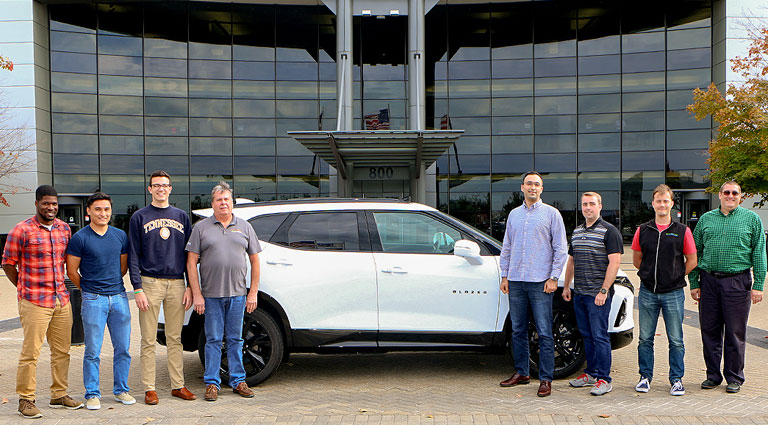Three Colleges Participate in Advanced Vehicle Technology Competition

The Tickle College of Engineering, College of Communication and Information, and Haslam College of Business have been chosen to participate in the EcoCAR Mobility Challenge, an Advanced Vehicle Technology Competition (AVTC) managed by Argonne National Laboratory sponsored by the US Department of Energy, General Motors, and MathWorks.
UT is one of 12 North American universities chosen to participate. Since 1988, UT has participated in 10 AVTCs.
The EcoCAR Mobility Challenge prompts university students to reengineer a 2019 Chevrolet Blazer to incorporate advanced propulsion systems, electrification, and connected and automated vehicle technology that will improve the energy efficiency, safety, and consumer appeal of vehicles, specifically for the car-sharing market.
Led by research assistant professor David (Butch) Irick of the Department of Mechanical, Aerospace, and Biomedical Engineering (MABE), a team of undergraduate and graduate students within the three colleges will participate in the four-year multidisciplinary competition.
“AVTCs provide our students with career opportunities and prepare them for embarking on their engineering future,” Irick said. “UT has a strong background in propulsion systems development; however, the connected and autonomous vehicle (CAV) technology component of this competition will be a new challenge.”
Additional faculty advisors include Adjunct Research Assistant Professor David Smith and Associate Professor Subhadeep Chakraborty of MABE, Professor Hairong Qi of the Min H. Kao Department of Electrical Engineering and Computer Science (EECS), Professor Maureen Taylor of the School of Advertising and Public Relations, and lecturer Lynn Youngs of the Haslam College of Business.
Through the challenge, students will gain real-world experience solving complex engineering challenges and build teamwork and leadership skills for their future careers.
“With the addition of the CAV component and the mobility focus to this competition, the EECS team is able to interact more with the MABE team,” Qi said. “This is another great opportunity to learn how to interact with people in a truly multidisciplinary environment.”
UT students benefit from a hands-on experience with concept design, risk assessment, and technical work in vehicle propulsion, automated vehicle systems, and electrical systems.
Using the Chevrolet Blazer donated by General Motors, the team will use onboard sensors and wireless communication from the vehicle’s surrounding environment to improve overall operation efficiency in the connected urban environment of the future.
In the first year, the team will complete research and design. In the second and third years, they will use those efforts to develop a hybrid electric Blazer with CAV capability.
At the end of each year, the 12 teams will compete against one another in more than a dozen events. Teams will follow a real-world vehicle development process to meet rigorous technical constraints throughout the four-year competition, which will conclude in the summer of 2022.
“This competition gives me the opportunity to gain experience with the automotive industry while still in school,” said Dean Blanks, project manager for UT’s team. “As someone pursuing an interdisciplinary career with engineering and business, EcoCAR allows me to apply principles learned in the classroom to a wide range of real-world challenges.”
The EcoCAR Mobility Challenge builds on a 30-year history of Advanced Vehicle Technology Competitions (AVTCs) provided by the US Department of Energy.
EcoCAR aims to develop a highly skilled workforce by providing hands-on experiences designing and building next-generation mobility solutions to meet our nation’s future energy and mobility challenges.
For more information on EcoCAR, the participating schools, or the competition sponsors, please visit avtcseries.org or follow the team on Facebook, Twitter, and Instagram.